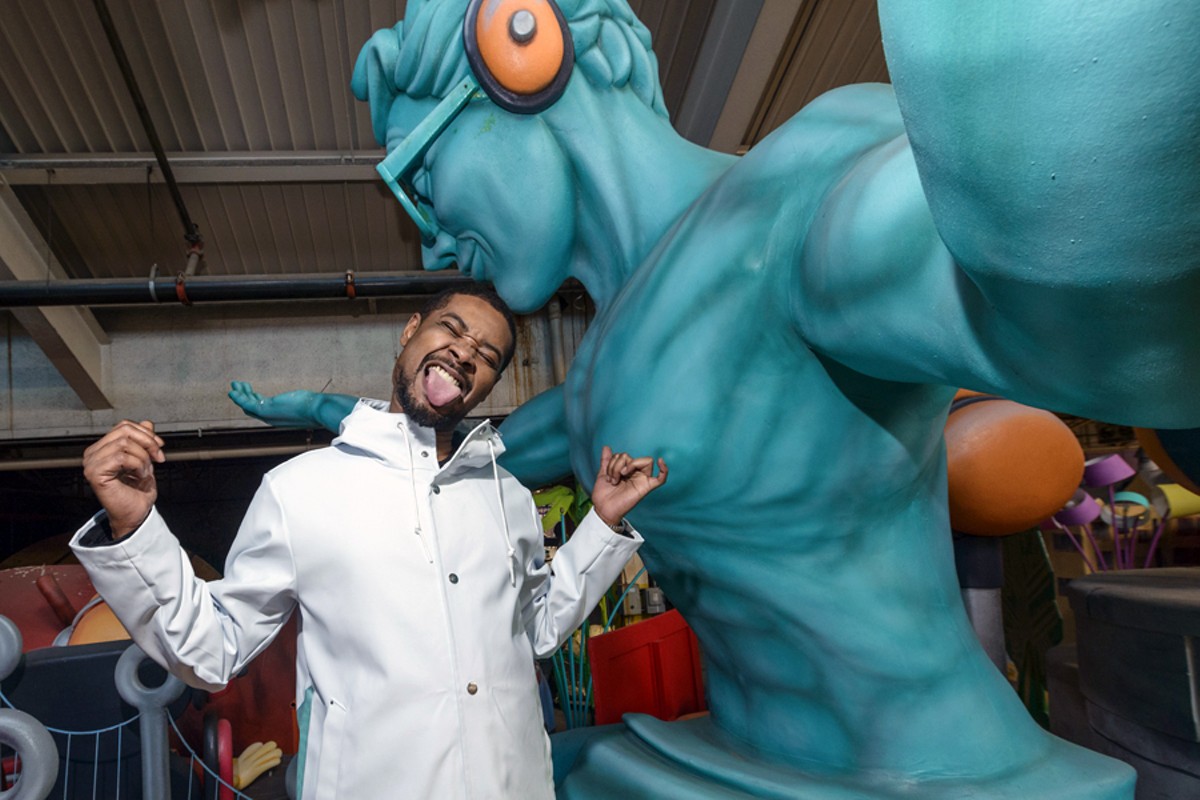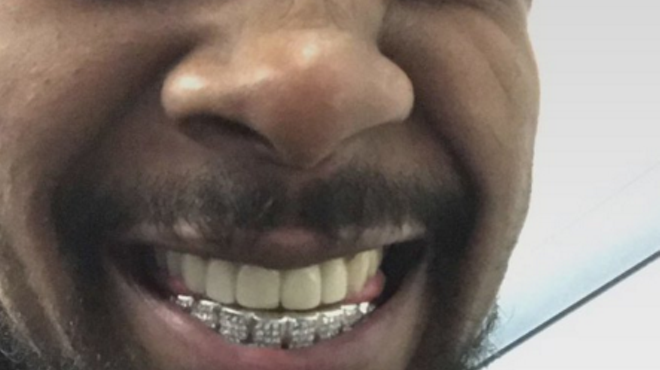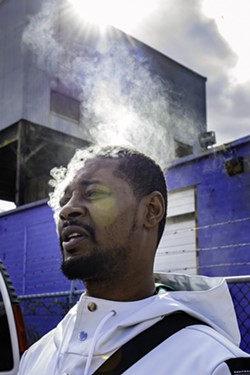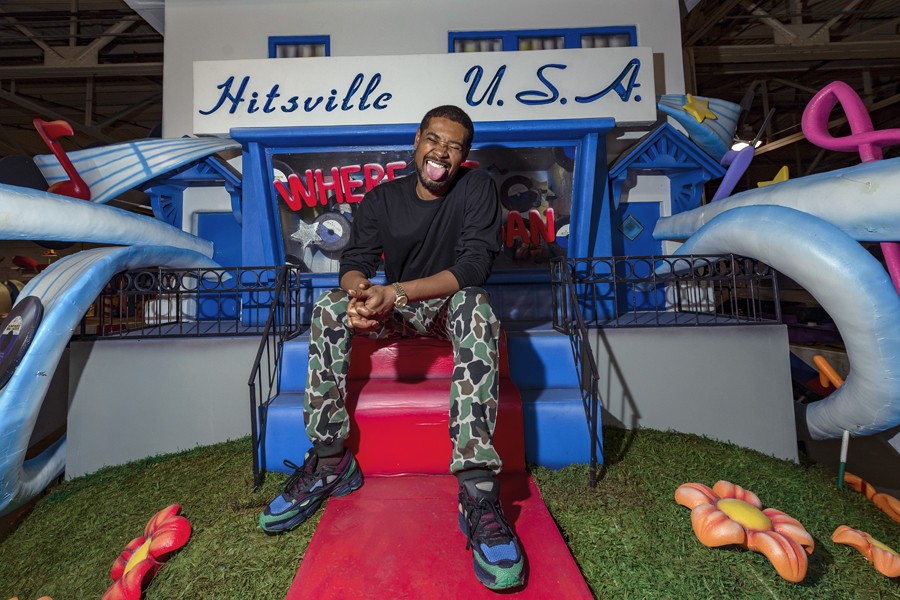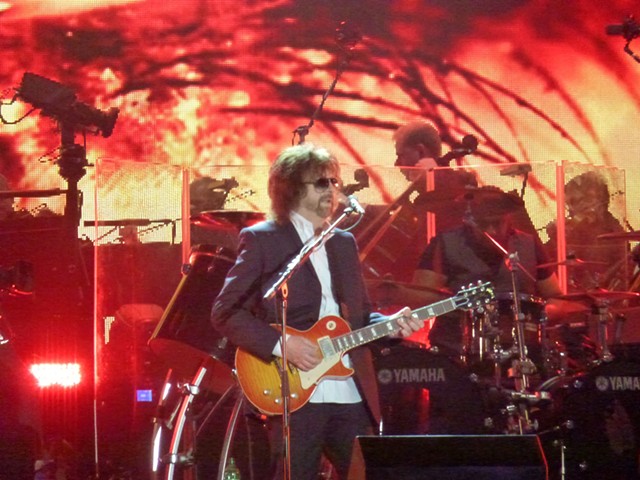Despite the overcast Michigan fall weather outside, within the walls of the Parade Company's headquarters on Detroit's east side, there is vibrant sunshine everywhere. A team of six work on a Woodward-bound float as Jimi Hendrix's "Voodoo Child" blares from an old radio nearby, while a young lady tours a septet of elderly visitors around the company's 110,000-square-foot facility.
Danny Brown is here for a photoshoot, but he's not looking like the Danny Brown we're used to. His haircut is unusually short and he's dressed in Adidas kicks, camo pants, and a sleek white jacket that makes him look more like a YouTube sneaker vlogger than the most eccentric emcee ever born on Detroit soil.
"Before, I would wear the most outrageous shit and walk around Detroit because I was a fucking nobody. Now I got shit that I wear on stage, shit I wear around the house, and shit I wear if I want to be fly," he says while showing a simple black T-shirt underneath his jacket.
Brown is having fun with the shoot; he poses with a replica of the Fox Theatre, papier-mâché heads of Coleman Young and Father Cunningham, and climbs on top of a float modeled after the legendary Hitsville U.S.A. He gives the photographer the parts of himself we're used to — a variety of hand gestures, a hanging tongue, and squinted eyes — but now with newly fixed upper teeth accompanied by a jeweled grill on his lowers.
Brown damn near broke the internet when he got his teeth fixed this past September. His gapped and broken-toothed smile (earned from several childhood mishaps) had been his unofficial trademark (kind of like a hip-hop Michael Strahan). "I didn't fix them because I wanted to, but because I had to" he says as the photoshoot ends. "My teeth were fucked up, so I had to fix 'em." Part of Brown's impetus for his extreme makeover, he says, has been his recent foray into acting. He made an appearance on Comedy Central's Detroiters, has a role in next year's movie White Boy Rick, and he's currently enrolled in acting classes.
"I didn't pick acting, it picked me. I wanted to go into voice-overs, but people want to see my dumb ass," he says through a grin.
Brown lights a square and talks about his ascension through Detroit hip-hop, being an aspiring teenage rapper in the late '90s, and getting a little help from an O.G. drug-dealer named Big Meech (not the Black Mafia Family Big Meech). "He picked me up from school, would throw me $50, and tell me to keep rapping," he says.
Even as he's currently centering his life around new creative challenges, Brown says he stays motivated by the struggles he went through on the way to his eventual success. "Back when I was rapping, people didn't rap that much," he says through a cloud of cigarette smoke. "You had Chedda Boyz and Street Lord'z, but people didn't look at rapping as a way out. Hip-hop was in a transition phase, and it was hard to be a rapper coming out of Detroit."
His assessment seems pretty accurate. By the '00s, such groups as Slum Village and D-12 were known around the globe, and the deaths of Blade Icewood, Wipeout, Dilla, Proof, and Baatin took some attention away from up-and-coming Detroit hip-hop artists. "You had Dilla, you had Em; the standards were so high at that time," he says. "That's why I had to go somewhere else."
Although Brown took the scenic route to his current place in hip-hop, he's not willing to change anything. "You don't know what you're getting yourself into, that's why you see a lot of kids burn out so fast," he says. "This shit is really a fucking business, it's a fucking 9 to 5. I can't imagine myself being 20, I would have crashed and burned real quick."
Brown's youthful period of struggle has also prompted him to start volunteering his time with InsideOut Literary Arts Project, a nonprofit committed to inspiring kids in poetry and self-expression. This year will be Brown's fourth straight November working with InsideOut. "I wish I had something like that when I was a kid," he says. "I'm going to hang out with them like I always do."
Benjamin Alfaro, the Teen Youth Specialist for InsideOut, tells us later that "students participate in a writing workshop that utilizes Danny's music as source material... perform original work for Danny to critique, and host an informal dialogue." Alfaro adds, "He's helped in various fundraising campaigns, both as a donor and advocate, in the past. Our focus with the partnership is foremost to value him as an artist with incredible insight, and secondly as a Detroit innovator and cultural icon."
Brown makes a seamless transition from cigarette to blunt. He walks out to the far end of the Parade Company's fenced-in parking lot, keeping the contact-smoke away from visitors and staff. On the night of Wednesday, Nov. 22, this lot will be frantic, as the hundreds of huge papier-mâché faces, multicolored balloons, and larger-than-life floats will be queuing up for the parade's annual march down Woodward Avenue. On that same night Brown's 4th annual Bruiser Thanksgiving concert will be blowing a hole through the roof of Club Fantasy.
"It wasn't really nothing for us or nothing for me to do when I'm here," Brown says. "I wanted to do something to put my homies on. This is a our fourth one. It gets bigger and better every year."
This year's show features Venus X, Jlin, John F.M., Container, and Detroit Lines (Skywlkr and Black Noi$e). It will be co-headlined by the eccentric Lil B of Berkeley, Calif. "I've always been a fan of what Lil B did," Brown says. "I feel I wouldn't be here if it wasn't for Lil B. You gotta give thanks to the BasedGod."
Although Brown touts Lil B's influence, there are plenty of erratic, tight jean-wearing, molly-rapping, bar-spitting millennials who've been inspired in every way by Danny Brown. Brown is the kind of hip-hop artist who seeks to continually push and redefine his sound after every release. He put out 10 (plus) mixtapes and group projects between 2003 and 2010. He introduced his high-pitched voice in "The Hybrid" (Rappers I Know, 2010), set the world on fire in XXX (Fool's Gold Records, 2011). On Old (Fool's Gold Records, 2013), Brown rapped like he was trapped inside of a mood ring. And then Brown took an intermission.
Fast forward to a November 2014 Metro Times interview when Brown told us, "Right now I'm open to anything. I've seen the good and bad side of being on an indie label. There are pros and cons to anything you do. The allure of a big budget is something I've always fantasized about. To be able to just sample anything I want, to be able to make anything I wanna fucking make. Just to be able to expand my creativity as far as possible."
In January of 2016, Brown announced he had signed to Warp Records, and in August of that same year, Brown told Rolling Stone that $70,000 had been spent in clearing samples for Atrocity Exhibition, which dropped Sept. 27 last year. Brown acknowledges that he foreshadowed his move and that Warp is not your average indie label, and not especially known as a home for hip-hop. "A record label like Warp that's been around since the '80s — if you you're an indie that's been around for 20 years; then you are a major. They just playing on a indie scale," Brown says. "You think Better Made and Faygo ain't got no bread? You think Faygo ain't got no bread?" he says, alluding to brands with longevity. "They [Warp] don't mess with that much hip-hop, so it's a big deal. It's an indie working on a major budget."
‘The allure of a big budget is something I’ve always fantasized about ... to be able to make anything I wanna fucking make.’
tweet this
Enter Atrocity Exhibition (Warp, 2016) — Brown's most experimental album thus far. He sampled the German band Guru Guru and took listeners on a tour inside his morbid state of mind in "Downward Spiral." He borrowed wicked strings from Embryo for the rock-infused "Golddust" and gave us one of the best posse cuts of 2016 with the frenetic, Kendrick Lamar-featuring "Really Doe." Atrocity Exhibition is Danny Brown's psychedelic Detroit manifesto. It's his best writing to date, and he slightly deviated from his usual mosh-pit festival bangers.
"I never want to be predictable. At the end of the day I want to challenge myself as an artist," Brown says. "I don't want to keep repeating myself doing the same shit. I still want to rap about my life so it's about figuring out different ways to [tell] the same story."
But Brown is also one of the undisputed kings of underground hip-hop with a loyal cult following. Atrocity Exhibition is a compelling body of work — but did it conflict too much with the Danny Brown his fans are used to? History has shown that a swift change in musical direction can irritate your core fan base. (Ask Lupe Fiasco.)
"You can't do whatever you want to do. It's like they're babies, you can't start feeding some mushed-up applesauce and then give them a steak tomorrow. Their teeth aren't even ready for that," Brown says while flicking ashes from his blunt. "You gotta take your time, you can't torture your fans. They're the reason we get to do what we want to do with our lives. But I'm still challenging them the same way I'm challenging myself."
Even though the shine has not worn off Atrocity Exhibition, Brown has already started working on a new project. There is no date set and he's completely removed himself from all aspects of the production process. "This is the first time I'm doing an album and I'm just going to worry about rapping," he says. "I'm more of a songwriter than anything else, so why not get with a top-notch producer?"
Brown won't give the name of the "top-notch producer" but he gives this hint: "Just think of a big-name producer that really loves Detroit hip-hop, that takes a long time. I probably said too much," he says with a slight laugh.
In three and a half short years Brown will be 40; the age that used to require hip-hop artists to check into reality shows (the assisted-living home for rappers) and jump on tours with titles like "Back to the Old School." But times are different, emcees are staying relevant longer, and making better music. Royce Da 5'9" scored a No. 1 album in 2016, Eminem has a new project dropping, and Jay-Z has musically taken the hip-hop elder statesman role.
"My lane has always been comedy. I can be a [George] Carlin by then. I can be the Hov that puts you up on game, but it's going to be funny as a muthafucka'," he says through his classic stoner laugh. "As time goes by, I think I will just be figuring out better ways to utilize my comedy."
Brown continues to talk about how his dark comedic approach will always be a part of his arsenal, no matter his age or his creative outlet. He brings up acting again, and says there are other monetary avenues he's looking into so music won't be the sole source of his income.
"My hobby became my job," he says as he looks around the parking lot. "And when your hobby becomes your job, it feels like work, and when you do work, it's not that fun anymore. So I'm in the transition stage of doing many different things so I can turn music back to my hobby.
His maturation shows even if he doesn't want it to. He bought his mother a new house three years ago, and wishes he could spend more time with his 16-year-old daughter. "I'm never home, she's at the age where she needs me a lot, but I'm never around, so the best I can do is support her financially, and that's not always the best thing for her. Time is more important. She gets out of school in a few minutes, but I'm here with y'all," he says with a bit of guilt.
Brown's words are surprisingly earnest. The psychedelic hip-hop rockstar that a million rap fanatics would love to share a blunt with really wants to spend more time being Daniel Sewell — a loving son and a devoted father.
Brown finishes his blunt and slowly walks back to the entrance of the Parade Company, where his manager Dart is waiting for him. He admits he's kind of out of the loop with newer Detroit hip-hop artists, but he does like Nolan the Ninja and Chef Geech. He listens to a lot of podcasts and has season tickets to the Pistons that he's not sure he'll use because he's content being at home chilling with his bengals.
"Dogs are too loyal; with cats I will be gone for weeks and they won't fuck with me. I have to gain their trust back," he says confidently. "If a flood was to happen in your house, the dog would worry about saving you, but the cat would save itself. A dog might sit there and die with you. The cat is going to live to tell the tale. I need to live with people like that because it keeps me on my grind."
Doors for Bruiser Thanksgiving open at 8 p.m. at Club Fantasy, 6060 W. Fort St., Detroit; elclubdetroit.com; Tickets start at $27.

